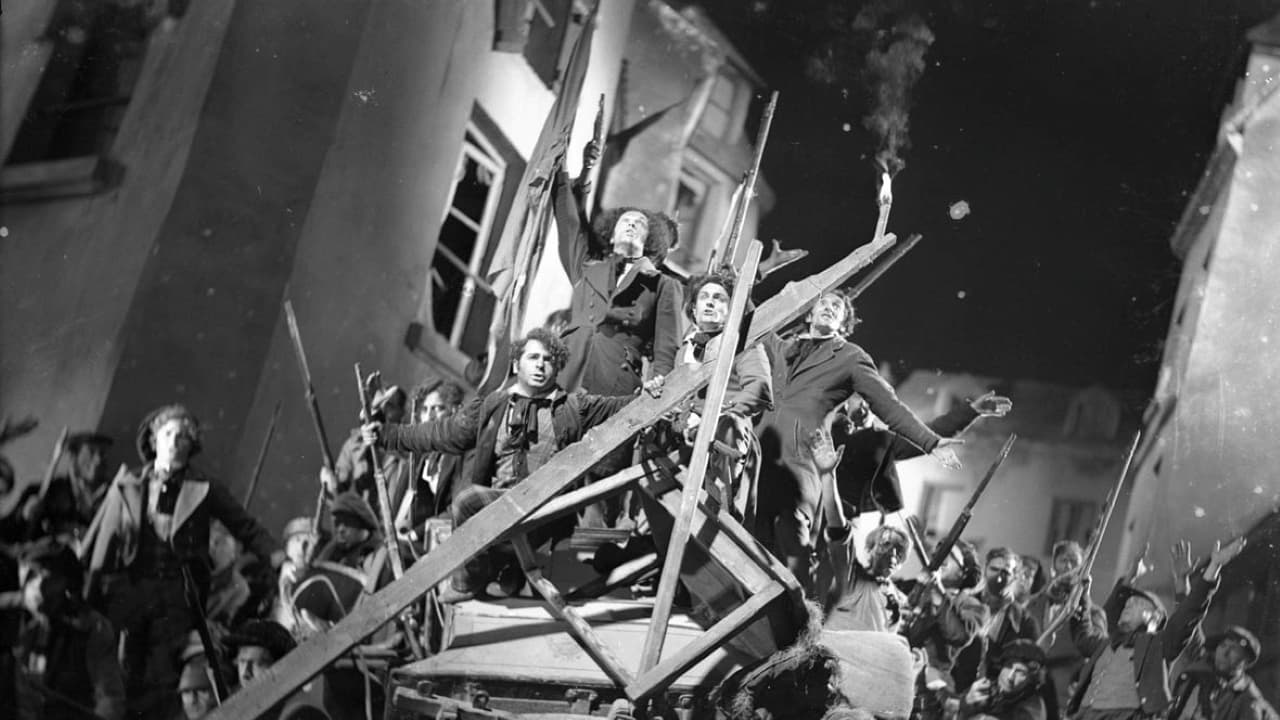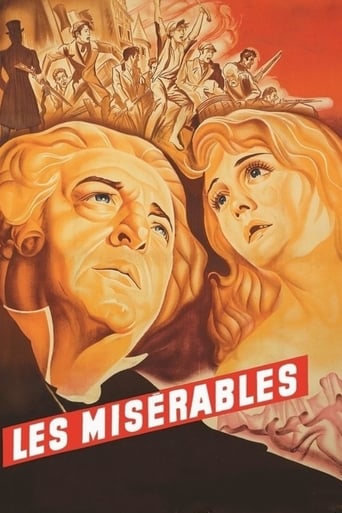CommentsXp
Best movie ever!
MoPoshy
Absolutely brilliant
Bessie Smyth
Great story, amazing characters, superb action, enthralling cinematography. Yes, this is something I am glad I spent money on.
Raymond Sierra
The film may be flawed, but its message is not.
dbdumonteil
Raymond Bernard was certainly the most underrated director of the thirties ;his name is almost never mentioned along the usual suspects :Renoir,Carné,Duvivier,Pagnol,Christian-Jaque,Grémillon,et al;he nevertheless produced two classics in this golden era: his gigantic "Les Miserables" and his work about WW1 slaughter, "Les Croix De Bois "which compares favorably with Gance's "J'Accuse" or Kubrik's "paths of glory".People interested in his Hugo adaptation (and they are numerous) should try and watch other works : a prolific director,he made forgettable movies (like everybody else) but "Cavalcade d'Amour " (1939) which tells three love stories in the same place but at different times;"Un Ami Viendra Ce Soir" a curious movie about the French Resistance - which might have inspired De Broca for his highly praised "Le Roi De Coeur ";"Le Jugement De Dieu" , a brilliant melodrama in the Middle Ages poorly remade later as a sketch of "Les Amours Célèbres with B. Bardot and A.Delon;a black comedy " Le Septième Ciel" ,all these movies worth seeking out;there's also a silent version of "Le Miracle Des Loups "(1924),later remade by André Hunebelle in the sixties.Forgive me for this long introduction,but it's really a pity this director should be ignored even in his native country (among the many comments,how many come from French users?).In the thirties ,it was a titanic task,actually an equivalent of Gance's "Napoleon" of the twenties;it's the only French thirties work which features three parts :at the time,in Paris, it was possible to see the whole in one day,for the theaters did not show the same film;later on,with the staggering exception of "Les Enfants Du Paris" ,the two-part movies (such as "Le Comte De Monte Cristo" and Le Chanois's much inferior own "Miserables" ) were released several months apart.The male cast is close to perfect:Harry Baur is considered one of best French actors of all time ,the extraordinary lead of Duvivier's first talkie "David Golder "and was made to portray Valjean ;his restrained but highly intense acting works wonders in the scene with bishop Myriel and in all his scenes with Javert played by the always reliable Charles Vanel ,the only French actor enjoying 2 movies in the IMDb top 250- 'Le Salaire De La Peur " and "Les Diaboliques" - by the way!matching them all along the way is Charles Dullin - a great stage actor whose portraying of Molière's Harpagon has remained memorable-as Thénardier ,with his face ravaged by greed;Jean Servais the French audience mainly remembers for his later parts and often forgets there was a time when he was young,and he is a very good Marius.On the other hand,the female parts are more uneven ;Florelle as Fantine is deeply moving ,the destitution's child who endures the unwed mother's fate;the great Marguerite Moreno shines as La Thénardier ,the actress was as convincing as a shrew as she was as a Grande dame;Pagnol's Orane Demazis is less talented as Eponine although she fortunately forgets her Provençal accent and has a good final scene (the part was intended for Arletty ) ;as for the forgotten actress who plays Cosette,she is totally bland (the part was intended for Danielle Darrieux)Although Waterloo is not included -represented here by a painting and some Thénardier's lines- there are imposing scenes on the barricades ,and the death of Gavroche ("this little soul had flown away") is really moving,with a young actor with more screen presence than his sister;more intimate scenes such as these with bishop Myriel go straight to the heart ;and "the tempest in the skull" shows Bernard's virtuosity ,here in a league with Abel Gance .Neither Le Chanois's nor Hossein's versions ,let alone American effort starring Liam Neeson can hold a candle to Bernard's Magnum Opus.
Catrician
Length seems to equate to epic in the general sense of the word nowadays. Cameron's "Avatar" went from being an Oscar worthy sci-fi blockbuster to an Oscar worthy sci-fi epic by upping the length. However, in the case of Avatar, the length doesn't do a huge amount for it, other than finding more crevices to squeeze in the best CGI ever seen in film. There are plenty more examples, too. Wyler's "Ben-Hur" is a fantastic example of an epic that exists for the sake of being an epic. Sure there are some breathtaking scenes throughout (notably, you guessed it, the spectacular chariot scene finish), but it tends to drag in numerous places; and that's coming from someone who's infatuated with Tarr's seven and a half hour "Satantango". Or perhaps look at Jackson's "Lord of the Rings" trilogy, which could have been a solid two hours shorter in total at minimum, or Cameron's "Titanic", whose extra length seemed to only provide extra melodrama and sentimentalism. This begs the question, how does one pull of this "epic" film correctly?Sometimes, it's by sheer quality and scale. Kubrick's "Barry Lyndon" accomplishes this and also is one of the hardest hitting emotional movies I've seen in a while, and I had no actual interest in watching it in the first place. I had a similar experience with Fleming's "Gone With the Wind", which I also loved to death. It seems at this point that the word "epic", or any film with a running time above two and a half or three hours seems to have a few key ingredients: grande scale, impeccable acting, but emotionally aloof and formulaic, and even the former two masterpieces sometimes have these issues in them. How does Bernard overcome this? What makes his Les Miserables my second favourite film of all time (behind De Sica's "Bicycle Thieves")? The reason is that he has mastered the art of emotional power and comprised it into this four-and-a-half hour magnum opus of French film, while also displaying his immense talent for set production, direction of acting, his technical capabilities, mastery of a myriad of genres...For those of you unfamiliar with the Les Miserables story (the extended and "real" one I mean, not the watered down Hooper pretty musical version), it goes a little something like this: Jean Valjean is released from prison after a number of years due to his criminal activity within the government's control. Additionally, he now must carry around a voucher explaining that he is a dangerous man and said voucher must be stamped if he is to leave a certain boundary. Due to this, he has grown to be very bitter. A preacher assists him and gives him a quick start to help his life a bit, but Valjean takes advantage of his hospitality and steals from him. When he is arrested, the preacher simply insists that it was a "gift" and that Valjean forgot the rest of his gifts, in this case, two sterling silver candle-holders. It is in this sequence that the audience can truly see the beauty of humanity, and Bernard is one of the few to have captured this, arguably one of the first, and he is able to do it without melodrama, over indulgence on sentimentality, or even music. Valjean's life intertwines with a number of other stories, including the saving of an orphan, in addition to numerous others, as he vows to do the best that he possibly can in life after this simple hospitality. Some scenes in the film are technically brilliant, and criminally overlooked given the time of the production. The steady-cam use in the riot scenes in part three are incredibly ahead of their time, and Bernard's juxtaposition of multiple scenarios in part one (with Valjean's confession) is a direct homage to Griffith's "Intolerance" and Bernard does it better, giving Hitchcock a run for his money as "master of suspense". The power packed in the last half hour is stronger than that of many directors' entire career, and a great portion of this is due to the outstanding performance by Harry Baur as Jean Valjean, who makes Hugh Jackman's performance look like it originated from a B-movie. As of the time of this writing, the film has 814 votes on IMDb. It's a tragedy how underseen this movie is, but it has garnered an almost unanimous acclaim among the few that have. The story never lags, never becomes boring, and I was literally mesmerized the whole time, never knowing the outcome of the next chapter. It's not a philosophical film, nor does it have a very complex message, but its power comes from its simplicity, it's perfection, its entertainment. It is the ultimate film, and I long for the day that another director is able to make something anywhere close to it.Rating: 10/10
Orren
This film is available from Criterion. It shows up on eBay with some regularity. Expect to pay $25 plus postage. Raymond Bernard's films have been released in four sets. Les Miserables is contained on a 3-disk set. It is number 4 in the Bernard series. I have just bought one at auction. There remain 3 other listings as of this date, January 4, 2009. The original Pal Secam films with Baur are harder to find, such as the "Rasputine." I am considering buying the region-free, Pal Secam converter, which can be found for under $300, and with which the old VHS PAL Secam tape can be burned to any DVD, and can play on any television. Hope this helps.
Jesús Ibarra
Since many years ago I've been a fan of Victor Hugo's novel, Les Miserables, and I can say this is one of the best and most faithful film adaptations of the story. Harry Baur is great as Jean Valjean, and all the cast in general is excellent. There is only one thing I may object about the film: the omission of the episode of Jean Valjean and Cosette in the Petit-Picpus convent and consequently the omission of the gardener Fauchelevent. This film is far much better than the one which is consider the classic version of Les Miserables, the one directed in 1935 by Richard Boleslawski, starring Frederich March as Valjean and Charles Laughton as Javert. Raymond Bernard's version of Les Miserables is only comparable to other two French film versions of the novel: the 1982 directed by Robert Hossein, starring Lino Ventura and the 2000 TV version, directed by Joseé Dayan, starring Gerard Depardieu.

